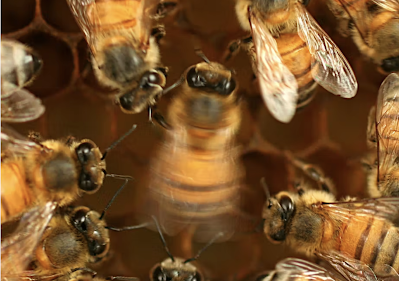 |
| The center bee does the waggle dance. (Photo by Heather Broccard-Bell, CC BY-ND) |
The connection between humans and whales has been so strong that a humpback whale song was included on NASA's Golden Records, launched into space on the Voyager spacecrafts as a representation of life on earth, reports Kiley Bense of Inside Climate News. "After decades of conservation efforts to protect whales, two recent books shed light on why they're still threatened—and how we might change that. . . . Tom Mustill's book, How to Speak Whale, offers one possible means of altering whales' fate: technology."
 |
| Black-capped chickadee (Photo by Scott Martin, Cornell Lab) |
Mention Canada, and many people will think of mountains, beauty, Mounties, etc. One thing people don't think about is tornadoes. Canada has the second-highest number of tornadoes each year, reports Oliver Whang for The New York Times. Another surprise, Canada's tornadoes are hard to count. "Canada is vast. . . . Canadian tornadoes end up touching down in areas with no [human] witnesses. . . . The Northern Tornadoes Project in London, Ontario, has been seeking to address this. . . . Using social media and eyewitness reports, satellite imagery, drone footage and fallen trees, the group has tracked more Canadian tornadoes than ever before."
 |
| Left: Black widow spider. Right: Brown widow spider. (Photos by Louis Coticchio, The New York Times) |
Found an egg in your pocket? Well, that's worth quite a bit. "For the first time in human history, the care and keeping of 11 hens all winter to receive one egg a day is now a pretty good deal," reports Eliza Blue of The Daily Yonder. "Imagine my delight then when the very next morning I arrived at the coop to discover not one, not two, but four eggs! It felt like I had won the egg lottery now that I knew how much they were worth. I complimented every single one of the hens since I couldn't be sure who had actually laid the eggs. . . . It also was a wonderful reminder that we've tipped toward spring and spring's abundance as hens increase their laying with the return of the light."
In some states, insects are not considered wildlife. They are left unprotected, and yet . . . "Bees, butterflies and beetles pollinate plants, enrich soils and provide a critical protein source for species up the food chain. The U.S. Forest Service says, 'Without pollinators, the human race and all of earth's terrestrial ecosystems would not survive,'" reports Catrin Einhorm of The New York Times. "Conservation officials in at least 12 states have their hands tied, legally speaking, when it comes to protecting insects. The creatures are simply left out of state conservation statutes, or their situation is ambiguous."
No comments:
Post a Comment